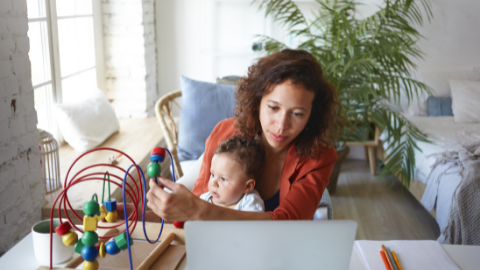Utah Women and Work: Caregiving Challenges During Covid-19

A recent study from the Utah State University Utah Women & Leadership Project (UWLP) outlined specific challenges women in the workforce faced during COVID-19, including the negative impacts on working mothers, challenges with childcare and managing a broad range of caregiving responsibilities.
Susan Madsen, founding director of the UWLP and one of two authors of the study, said themes that emerged were the “struggle to juggle,” workplace support, spousal support, guilt, and unique impacts on single mothers.
“Not surprisingly, we learned that due to the pandemic, thousands of women experienced incredible stressors that negatively impacted their work and home lives,” she said.
Of caretaker respondents, 73.2% reported difficulty managing home and work duties. One mother noted, “I end up working late into the night to keep up with everything. My work schedule and my home schedule are blurred, and I feel there is no downtime available.”
Unfortunately, the juggling efforts led many women to feel guilt, which was mentioned by 30.8% of the respondents. As one mother stated, “I feel guilty most of the day telling my child that ‘mom needs to work right now.’”
Another stated, “I don’t think, as a woman, I’ll ever recover from this. My career stalled, I’m financially ruined, frazzled and spread thin, and my children are behind socially or educationally. I feel like a ‘slacker’ when I attend to my family’s needs, and the emotional toll has broken my marriage because of serious inequality in unpaid labor. I guess this will be a scar on the rest of my life. I’ll never forget it.”
Of the working mothers in the study, 22.4% discussed the support levels of their spouses, with 24.4% saying they felt supported, and 75.6% saying they did not.
“My husband is a true partner in our home; he does all the grocery shopping, lots of cooking and cleaning, and he made Christmas happen,” said one respondent.
However, hundreds of respondents discussed spouses who did not provide support at home, and that additional caregiving and home responsibilities fell on them.
As far as workplace flexibility, some women reported employment that was flexible, yet hundreds noted that their employers were particularly unsupportive during the pandemic.
One woman stated, “When we returned to work, my employer made no allowances for me. I was required to work more than twice the hours, I had to tell my kids’ teachers that they would not be doing their schoolwork because my husband and I had to work full-time.”
One single mother of two young school-age kids said at least once or twice a week she felt like she simply couldn’t juggle work and family anymore, but she had no other option.
Marin Christensen, UWLP associate director and lead author of the report, explained that the challenge of finding childcare during the pandemic increased, and while funding existed to help childcare providers remain open, many lost access to it for varying reasons.
“Mothers who had used family for childcare said they could no longer rely on that because of the potential for exposure to high-risk individuals,” she said. “Others did not feel safe sending their children to childcare, in spite of increased safety protocols.”
Approximately 20% of respondents discussed other caregiving responsibilities beyond their own children. Many faced the stressful reality of caring for at-risk parents, while older respondents cared for and home-schooled grandchildren. For these women, having flexibility and an understanding workplace were as important as they were for mothers.
Madsen said, in spite of the challenges, there are actions that can spur a recovery for women in the workforce, including a more equitable distribution of child care and housework responsibilities and employers who provide flexible schedules and remote work options.
“Research has shown that empathetic and supportive workplace policies attract and retain employees, and thus increase employees’ psychological safety, organizational commitment and productivity,” she said.
In addition, she said Utah state and local governments can implement policies that support families in terms of childcare, flexible work arrangements, family leave policies and career relaunching programs.
“As Utah leaders and residents do more to understand the challenges caregivers faced during COVID-19, a more equitable recovery can be crafted,” she said. This will, in turn, strengthen Utah businesses, families, communities and the state as a whole.”
The full study can be found at https://www.usu.edu/uwlp/files/briefs/35-covid-19-caregiver-experiences.pdf or https://tinyurl.com/y96m6cwt. Further information about the UWLP can be found at utwomen.org.
Writer: Julene Reese, Julene.Reese@usu.edu
Contact: Susan Madsen, Susan.Madsen@usu.edu


 Utah 4-H & Youth
Utah 4-H & Youth